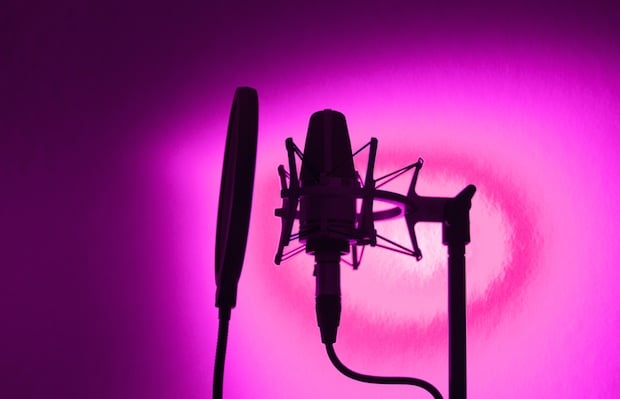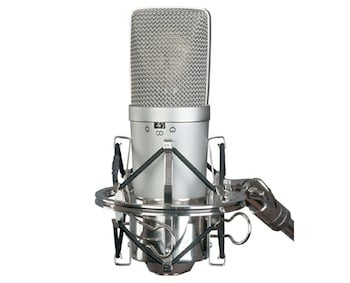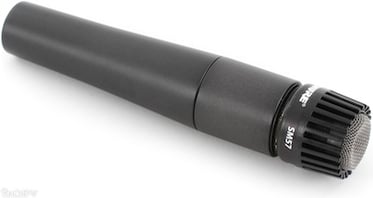 Image via Shutterstock
Image via Shutterstock
Choosing the right microphone is extremely important to getting your sound right. If your mic can't capture the sound clearly and accurately, even the best post-production won't produce the sound you want. Get the right sound by choosing the right microphone for the job!
Microphones turn sounds into energy signals. Different microphones do this in different ways, and you could spend years learning about all the different kinds of mics; in fact, some people do! However, the vast majority of microphones today can be grouped into two major categories: condenser and dynamic.
Condenser
 Image via proaudiostar.com
Image via proaudiostar.com
Best for: delicate vocals, capturing high frequencies, in-studio use
Essential condenser mics: Neuman U87, AKG C414, Telefunken U47
Condenser (or capacitor) microphones are commonly used in studios to pick up sounds with great detail and accuracy. This is accomplished with a lightweight membrane (referred to as the diaphragm) suspended by a fixed plate. Sound pressure against the diaphragm causes it to move, which in turn creates electrical output.
The important thing to note about this process is that condenser mics are delicate and are used to pick up and amplify more delicate sounds. Condensers use phantom power, or power from an external source (usually 48V sent from the preamp) to create their characteristically high output. This is ideal because you won't need as much gain at the preamp to get the signal to a usable level. If you use the wrong mic for the job with not enough output, it may need considerable gain at the preamp. Many cheaper preamps simply can't supply enough gain, or introduce too much noise when cranked all the way up. Condenser microphones resolve this issue.
Think about condenser mics like holding a magnifying glass up to sound, capturing all its intricacies with high accuracy. It would make sense to use this when capturing a crooning singer-songwriter, but not for a loud snare drum. For that job, we have dynamic microphones.
Dynamic
 Image via gearnuts.com
Image via gearnuts.com
Best for: powerful vocals, capturing strong signals, live use
Essential dynamic mics: Shure SM57, Shure SM58, Electrovoice RE20, Sennheiser 421 II
Dynamic mics work best to record loud sounds. Unlike condensers, they use a wire coil inside the microphone to amplify signal picked up by the diaphragm. The output is considerably lower than a condenser, which is appropriate when the signal you're capturing is already very strong.
The SM7, a popular dynamic mic made by Shure, rose to great popularity after it was used by Quincy Jones to record all of Michael Jackson's vocals for his album Thriller. The mic worked well with the strong presence of Jackson's voice and has maintained its status as a popular choice for recording big vocals ever since.
Dynamic microphones are renowned for their reliability and ruggedness. They need no batteries or external power supplies, and typically cost a fraction of what a condenser does. They're capable of smooth, extended response, and the output level is typically high enough to work straight into most mic inputs with an ideal signal-to-noise ratio. A dynamic mic needs little to no maintenance, and with reasonable care will maintain its performance for many years.
Besides dynamic and condenser mics, there are many other types of mics for different jobs. Just to name a couple, there are carbon microphones, which used to be used in most telephones, and ribbon microphones, which capture sound with a thin strip of metal suspended in a magnetic field, and are extremely fragile and expensive. Different models of microphones also have different polar patterns, or different sensitivities to sound arriving from different angles, which is another important element to consider.
[The Essential Guide to Microphone Pickup Patterns: What Every Musician Needs to Know]
Take your time when choosing your mics, and do your research to make the choice that best serves you.
Max Monahan is a bassist and a writer living in Los Angeles. He spends his time working for an audio licensing website and shredding sweet bass riffs.







